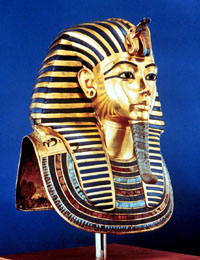 Recent CT scans performed by Dr. Zahi Hawass and his research team seem to conclude that the 19-year-old ruler of Egypt, King Tutankhamun, was not murdered violently. A blow to the back of the head had been suggested as one possible cause due to findings in X-rays performed in 1968 and 1978 which showed a bone fragment in Tutankhamun's skull.
Recent CT scans performed by Dr. Zahi Hawass and his research team seem to conclude that the 19-year-old ruler of Egypt, King Tutankhamun, was not murdered violently. A blow to the back of the head had been suggested as one possible cause due to findings in X-rays performed in 1968 and 1978 which showed a bone fragment in Tutankhamun's skull.However, the discovery of a break in the left thigh is causing the team to differ their opinions on whether the fracture happened before or after death. An open wound from the break could have caused a life-threatening infection and been the real cause of death, but the fracture may also have come from the embalmers, which doesn't seem likely, given the great care they put into preparation of the bodies. A stronger possibility is that the break occured during Howard Carter's original excavation in 1922 when the mummy was removed from his tomb. This seems a more likely scenario given the damage that happened to many mummies during that time period.
Artistically and scientifically, I've always held a fascination for ancient cultures, notably the Egyptians. The dedication poured into everything from the grand scale of their architecture to the colorful, detailed art of murals and funerary masks is nearly unmatched by anything we see today. The discovery of King Tutankhamun's remains by Howard Carter and Lord Carnarvon was also exciting for the fact that so many artifacts were found along with the mummy. Even more remarkable is the fact that centuries after the demise of the Ancient Egyptian culture, we continue to make new discoveries about their lives.
You can read more about the recent CT scan at National Geographic.
No comments:
Post a Comment